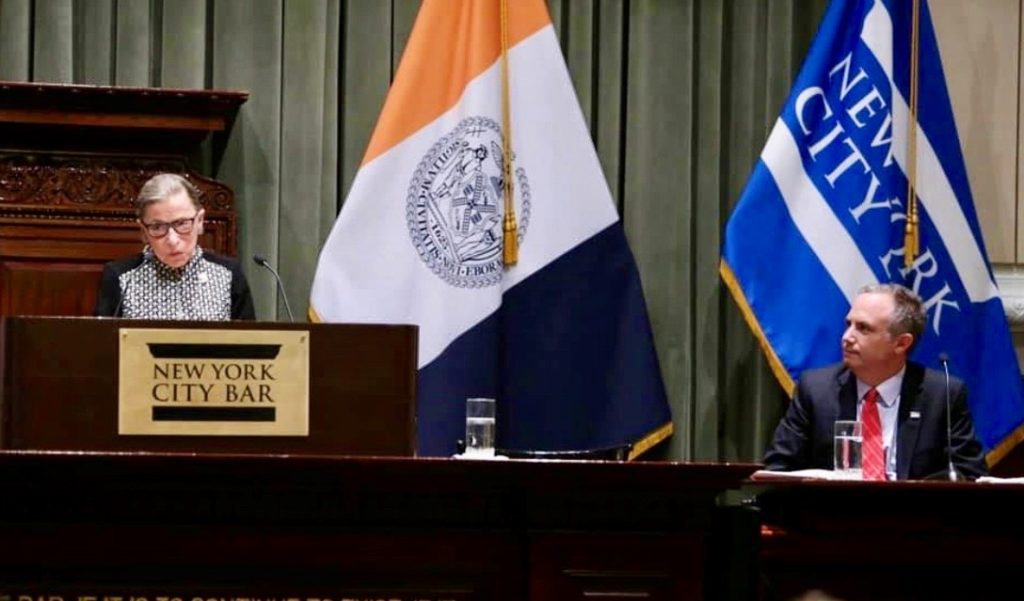
Photo courtesy of Bret Parker (seated to Justice Ginsburg’s left), Executive Director of the New York City Bar Association, and a person living with Parkinson’s disease.
A Life
My wife Tracey answers her cell phone.
“Mom…did you hear?”
Our daughter Meredith’s voice cracks; a few quick sniffs follow.
“Yes, sweetheart, I heard.”
“I’m so sad, Mom.”
“I am too, my Love,” says Tracey, her own tears again beginning to flow.
Our daughter Holly walks over and puts her arms around Tracey. It’s the second or third time she’s done this since the three of us heard the news while driving to Target for school supplies.
“But Mom, she’s done so much for us, and for every woman and girl in this country…I can’t believe she’s gone.”
“I know. Me, either. She made a lasting difference. We have to take her legacy and build on it.”
A Vision
It’s easy to draw inspiration from Ruth Bader Ginsburg’s life. Born to working class parents in 1930s Brooklyn, she overcame social structures and cultures that kept women and girls from having full access to what men and boys enjoyed—higher education, equal pay in the workplace, and equal protection under the law. Turned down for jobs at law firms, as well as for a Supreme Court clerkship with Justice Felix Frankfurter, Ginsburg was routinely paid less than her male colleagues when she was hired; one employer told Ginsburg that she would be paid less because she was a married woman whose husband had a good job.[1]
Not only was RBG a woman, she was a Jewish woman and a young mother; she faced three barriers to opportunity, equity, and justice that wrote life scripts in every generation of women before her.
She earned a law degree from Columbia University when her children were still young, itself a challenging feat, and began her academic career at Rutgers University; she later returned to Columbia to become the first woman to be tenured in the Law School. She also started the Women’s Rights Project and worked fiercely to bring cases involving gender and other types of discrimination and injustice to the Supreme Court; in 1993, Ginsburg became the second female justice ever confirmed to the highest court in the United States.
Her life’s work involved a tireless effort to articulate why discrimination and inequity was unacceptable and to act for lasting change.
This change included what many disability activists identify as among the most important Supreme Court decisions, namely, Olmstead vs L. C. (1999), which allowed persons with mental disabilities to choose to live in communities as opposed to living in institutions. Her work also focused on the rights of immigrants, on marriage equality, and on inequities faced by many marginalized persons and groups who face systemic and structural injustice.[2]
She noted, “I tell law students… if you are going to be a lawyer and just practice your profession, you have a skill…But if you want to be a true professional, you will do something outside yourself… something that makes life a little better for people less fortunate than you.”
An Opportunity
Reflecting on Meredith and Tracey’s conversation, I, too, am thankful for Justice Ginsburg’s life and for her contributions to justice and human decency that will endure—for Tracey, Meredith, Holly, other women and girls, for countless human beings of every gender. I think especially about the 61 million Americans (1 in 4) who live with disabilities, many of them underserved by healthcare and other resources, and of the barriers to opportunity, access, full inclusion, and dignity that so many still face.
In fact, I have heard many accounts from friends and others in the Parkinson’s community, to note just one group touched by disability, that echo what RBG faced personally and what she devoted her life to changing. These experiences include being ridiculed, passed over, infantilized, silenced, and barred from doing what one is capable of doing because one’s body or mind works differently than what the dominant culture considers the norm. As it was for women when RBG embarked on going to law school, and teaching the law, and serving on the Court, and working as an agent of justice; and like it still is for many women and others experiencing injustice.
When someone dies, Jewish tradition calls for saying, “Zichrono Livrocho: May their memory be a blessing.” Indeed, may Ruth Bader Ginsburg’s memory be a blessing; and may it include the fuel that sustains our efforts to build on her legacy of promoting justice, equity, inclusion, and access for all persons.
_______
[1] Adam Liptak, “Kagan Says Her Path to the Supreme Court Was Made Smoother By Ginsburg’s, The New York Times, February 10, 2014; Neil A. Lewis, “The Supreme Court: Woman in the News; Rejected as a Clerk, Chosen as a Justice: Joan Ruth Bader Ginsburg,” The New York Times, June 15, 1993.
[2] Samuel R. Bagenstos, “Justice Ginsburg and the Judicial Role in Expanding “We the People”: The Disability Rights Cases,” Columbia Law Review 104, no. 1 (2004): 49-59. Accessed September 19, 2020. doi:10.2307/4099347.
Allan Cole is a professor in The Steve Hicks School of Social Work at The University of Texas at Austin and, by courtesy, professor of psychiatry in the Dell Medical School. Diagnosed with Parkinson’s in 2016, at the age of 48, he serves on the Board of Directors at Power for Parkinson’s, a non-profit organization that provides free exercise, dance, and singing classes for people living with Parkinson’s disease in Central Texas, and globally via instructional videos. He also serves as a Community Advocate for ParkinsonsDisease.net, writing columns about living well with Parkinson’s. He is author or editor of 10 books on a range of topics related to bereavement, anxiety, and spirituality. His latest books, Counseling Persons with Parkinson’s Disease (Oxford University Press) and Discerning the Way: Lessons from Young-Onset Parkinson’s Disease (Cascade), will be published in 2021. Follow him on Twitter @PDWise.
